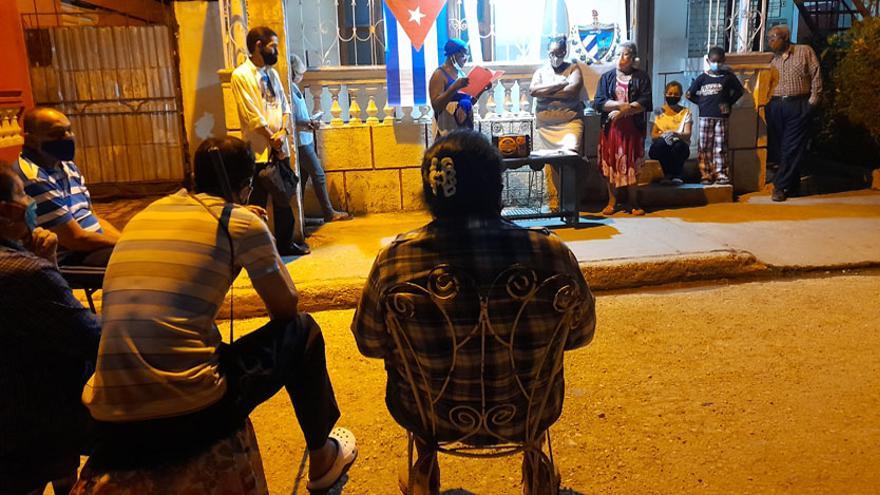
![]() 14ymedio, Havana, 9 March 2022 — No one had read the new Family Code this Monday when the debate was held in a neighborhood south of Morón, in Ciego de Ávila, in anticipation of a referendum on a date yet to be determined. At the very least, sincerity reigned in the atmosphere at the beginning of the discussion, whose interest seemed to focus on same-sex marriage, one of the few issues that have gotten the attention of the public.
14ymedio, Havana, 9 March 2022 — No one had read the new Family Code this Monday when the debate was held in a neighborhood south of Morón, in Ciego de Ávila, in anticipation of a referendum on a date yet to be determined. At the very least, sincerity reigned in the atmosphere at the beginning of the discussion, whose interest seemed to focus on same-sex marriage, one of the few issues that have gotten the attention of the public.
The Government opened this type of meeting to discuss the new rule on February 1 and promised that they will take place, until April 30, in 78,000 locations distributed throughout the Island.
“I haven’t read it, but I agree with what the code says,” said Marlén, the first to jump into the ring. Apparently with greater knowledge, Marcelo, another neighbor, was equally favorable. At first, it seemed that he was going to give a more explanatory vision of what the new rule includes, but he ended up referring only – again – to marriage.
Alberto, a retired prosecutor present at the meeting, affirmed that the new legislation is aligned with international standards, and maintained that the Government has consulted with a multitude of regulations from around the world, taking the best and most innovative of them. Although skepticism was visible in some of the attendees, on this point he was not wrong. According to legal sources consulted by 14ymedio, the legislation in no way falls short of those that exist in advanced countries.
This contrasts, however, with the lack of freedom in the country, reiterated after the July 11 demonstrations and the frustrated call for a protest on November 15, when the regime invoked Article 4 of the Constitution, that is, the “irrevocability” of the socialist system. On the other hand, there is the paradox that given the publicity that the Government is giving to the “debates” of the Family Code, the also imminent new Penal Code, more repressive, will be approved without discussion.
At the meeting in Morón, a colonel who lives in a building in the area, Carlos, took the floor to launch a whole series of slogans repeated for months by the official press. That the text was a one hundred percent Cuban code, born of ideas rooted in the nation, that it doesn’t copy anyone and that it was the revolutionary vanguard representing the people.
The argument did not stop, despite the fact that some attendees were beginning to tire. The military man continued arguing that the code was by and for the Cubans and, broadening the theme, that the enemy was trying to misrepresent the Cuban reality.
At that moment, a religious voice broke out, claiming Fidel Castro’s halo of sanctity. It was Amalia, a new resident in the area. Raising a sheet of paper in her hand, she stood up and proclaimed that she was a Christian and that the new Family Code is inclusive and based on the Bible, since it respects everyone, which Christ would approve of. To conclude, she thanked the Revolution, the Communist Party and the late Castro and cried out: “Long live Fidel under the gaze of Christ.”
When it seemed that no dissenting voice was going to emerge, Yunior took the floor to express his disagreement with the obligation to provide food to family members that appears in Article 27 of the new code.
Although the text stipulates that Cubans must help their close relatives as long as they can, the resident who had just spoken literally interpreted that to mean that she was obliged to assume the “custody” of as many mouths to feed as those that shared blood with her.
“I have 14 uncles and I only know three of them,” she said dissatisfied. The moderator asked her if her proposal was to eliminate or modify the article and Yunior stepped in to propose the latter, alleging that the duty should only be reciprocal, for those who had previously cared for one.
The novelty generated, finally, a shower of comments, and many expressed themselves in favor of the position of the new resident who, seeing the success, wanted to open a new topic: youth emancipation. However, everyone fell silent and the debate came to an end.
____________
COLLABORATE WITH OUR WORK: The 14ymedio team is committed to practicing serious journalism that reflects Cuba’s reality in all its depth. Thank you for joining us on this long journey. We invite you to continue supporting us by becoming a member of 14ymedio now. Together we can continue transforming journalism in Cuba.
